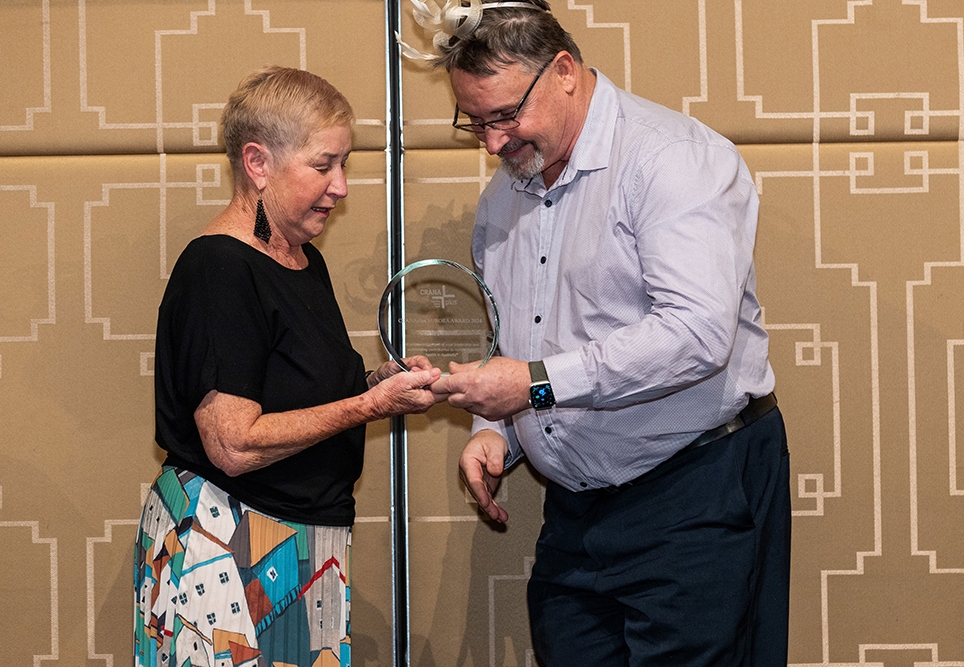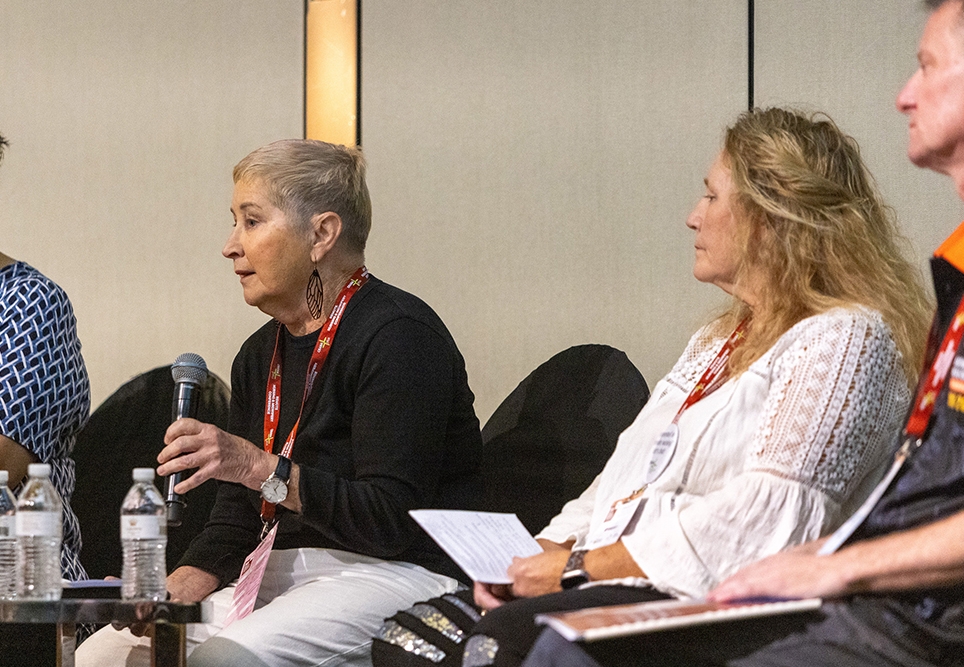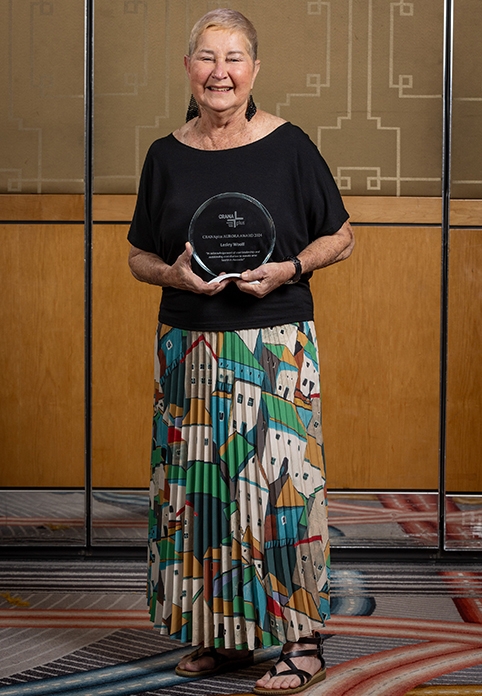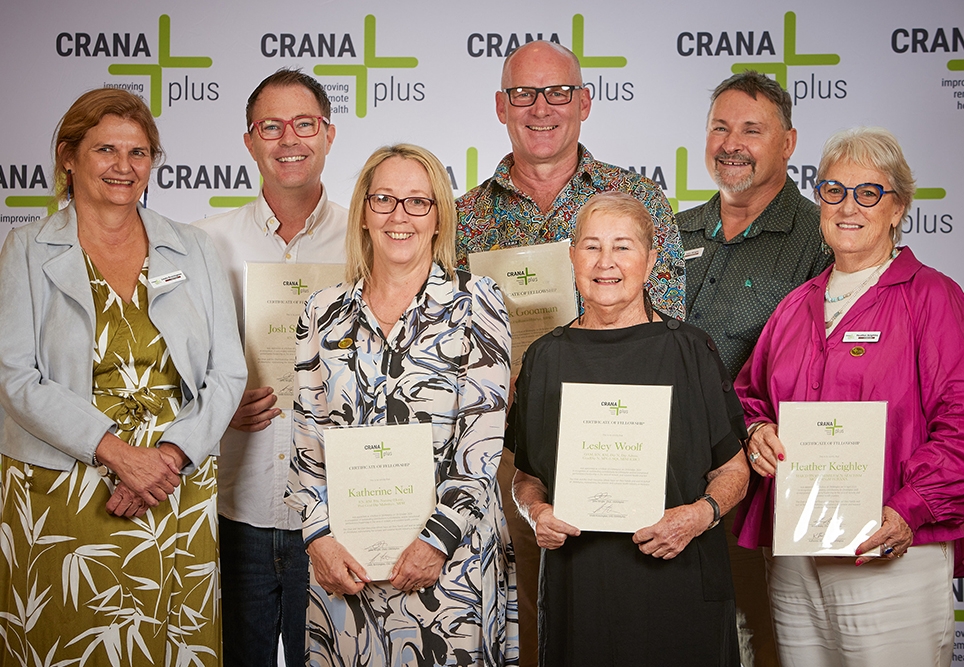This site may not work properly using older versions of Edge and Internet Explorer. You should upgrade your browser to the latest Chrome, Firefox, Edge, Safari, or any other modern browser of your choice. Click here for more information.
Your Stories
This is where we tell your stories, cover topical issues and promote meaningful initiatives.
Remote Area Nurse Lesley Woolf's latest accolade – 2024 CRANAplus Aurora Award for the Remote and Isolated Health Professional of the Year
For Lesley Woolf, Executive Health Manager at Mala’la Health Service Aboriginal Corporation in Maningrida, this is a time of recognition for her decades of commitment to help improve the health of Aboriginal people in remote Australia. Here she talks about her belief in the rising star of primary health care.
“I am just doing my job,” says Lesley whose latest accolade is the 2024 CRANAplus Aurora Award – for the Remote and Isolated Health Professional of the Year, which was presented to her at the organisation’s conference in Melbourne in October. As her nomination states: Lesley’s quiet dedication to and advocacy for the health of remote communities reflects CRANAplus values, particularly integrity, social justice, and inclusiveness in supporting the delivery of quality, safe health care in remote and isolated settings.
Earlier this year, Lesley was awarded the Medal of the Order of Australia in the King’s Birthday 2024 Honours list for service to Indigenous health and to rural and remote nursing. And in 2023, she was chosen as a finalist in the NT Senior Australian of the Year Awards for her work in transitioning health services to Aboriginal Community Controlled Organisations in the Territory.
Lesley is quick to embrace the entire nursing community in acknowledging her recognition: “You do what needs to be done, identifying needs and working as hard as you can to get things done. You see what can be improved and try to get that. You want to make a difference.”
She then moves on to talk about her favourite topic – primary health care. “If we are going to improve health in Australia, in fact worldwide, we really need to look more carefully at preventative health, be proactive in terms of health.
“I think primary health and remote health is becoming sexy and more attractive than ever.
As a member of a panel at the conference discussing the National Rural and Remote Nursing Generalist Framework, Lesley recognised its value in providing guidance for nurses in remote areas, processes for organisations striving to be better, and recognition of the extent of the work done by remote area health professionals. This framework describes the unique context of practice and core capabilities for rural and remote Registered Nurses in Australia.
“While I see interest in remote health care moving in the right direction, it’s still hard to get nurses into these roles particularly with the right skills and experience. It’s important that they are well prepared and receive a lot of support. To go out there unprepared can scar people for life.
“I can see more and more people wanting to become remote area nurses. I think that’s great.
“The old adage of seeing people who go into the outback being Missionaries, Mercenaries and Misfits, is fading. In terms of the health field, we are seeing more people wanting to be remote area nurses for the right reasons, with a genuine interest in Aboriginal and primary health care.
“There are more and more opportunities for nurses to follow that path and, of course, CRANAplus is an important part of that, including offering more and more courses that provide easier access to professional development and rural and remote context.”
Lesley is also thrilled to see more Aboriginal people becoming health practitioners, and more being done to make this possible. “When I see local people with the knowledge of health practitioners speaking to local people, often in language, talking to each other about health, taking ownership… that’s my dream.”
Lesley, who has now been at Malal’a for nine years, lists a few opportunities over the years that opened her eyes and expanded her mind on the depth and value of primary health; instances and opportunities that made her think over the years.
Working in Queensland for 30 years, Lesley’s nursing career started on the wards of Cairns and Mount Isa Hospitals, soon managing the emergency department. “I saw such disparity in the burden of disease for Aboriginal people,” she says. “I was probably a bit naïve.”
Coming back years later as Director of Nursing, Lesley then had responsibility for all the communities in the far west region. ”I’d previously gone out to Doomadgee which had a little clinic that was basically falling down, it was so poor. There was no real health service and patients had to be flown out all the time.
“If a child had a temperature, they had to fly them out, the health service was so limited. As Director of Nursing, I started talking about a new health centre, and I focussed on the fact that it would be so much more cost effective. There would be no need to fly out so many patients. Eventually we got that seven-bed health centre.”
A huge eye-opener which was ‘a tough gig’, was her appointment to the Board of Directors for a diversionary centre in Mount Isa, dealing with people who would otherwise end up in prison. “There, I saw how providing a feed, a bed and care, and they’d walk away a much better person. Sometimes, I’d manage to fast-track them to the emergency department to see a doctor.
“It became obvious that if you care for people, provide basic care, you can change lives.”
Moving to the Northern Territory to work and eventually for Sunrise Health Service in Katherine, Lesley was moving essentially from a background in hospital environments to community. “The CEO at the time made me think differently. I say thank you every day in my life that he helped to change my direction,” says Lesley. “He gave me that opportunity.
“I had been in hospitals most of the time, focussed on how many beds, how many spare beds, beds in emergency, and there was never enough money.
“I had come in from a fairly green perspective. I thought before this that I knew what primary health care was. But I realised I knew nothing about primary health care and I had to be humble and ask a lot of questions.
“Sunrise was all about service provision – in the home and in the community. It was about prevention rather than reaction. Working with the community and talking about what their priorities are. Thinking of what is best for the community. And I realised that it was important to apply this in the hospital setting too.
“In primary health care you can control budgets better than in a hospital,” Lesley acknowledges. “You can have patient recalls. We work on preventing people from getting sick, not helping people get well.
“While hospitals are so essential, I can see that primary health care also has an important role to play and really is essential in making a difference.”
Continue reading about 2024 award recipients in the Excellence in Remote Health Practice and New to Remote Practice categories, or nominate a colleague for an award.



